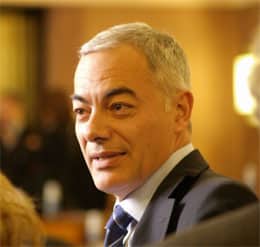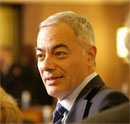During its vacation week, the Nice Premium team is delighted to offer you a compilation of its best articles. For this second-to-last day, you will find the 5 most viewed interviews of the year on Nice Premium.
 Nice Premium: Patrick Allemand, why did you accept the presidency of the tender commission after initially refusing it?
Nice Premium: Patrick Allemand, why did you accept the presidency of the tender commission after initially refusing it?
Patrick Allemand: I had refused the presidency of the tender commission because the initial conditions of the discussion were not acceptable. It was out of the question to accept the presidency of such a delicate commission in a city like Nice in a composition where our president, since it concerns Marie-Luz Nicaise-Hernandez, would be in a position to sign decisions she would not endorse in terms of the regularity of a market. It was out of the question to have a nominal presidency.
Negotiations allowed us to move forward. As soon as the Mayor agrees not to have an absolute majority within the tender commission (3 Estrosi members, 2 Change Era, 1 Peyratist), and when in the case of a tie the president’s vote is decisive, this gives us true effective control power, very useful to the opposition, even a blocking power. Therefore, there is no longer any reason to refuse this presidency unless one wants to remain in a sterile opposition posture.
To be completely exhaustive, it must be understood what the role of the tender commission is. It is not about using this commission to block projects on which we would disagree. The tender commission is only there to verify the regularity of market operations, not to discuss the substance of the files.
The substance of the files, the political confrontation when it occurs, takes place in the municipal council.
Thus, our colleague Marie-Luz Nicaise-Hernandez may perfectly be led to legally validate a market related to a project on which the “Change Era” group will oppose in public session. And she will vote against it with us.
I provide this explanation so that the faithful of Nice Premium understand well that this presidency does not in any way neutralize the opposition.
NP: What do you think about the entry of the opposition into CANCA?
PA: The situation resulting from the Peyrat era was abnormal and constituted a denial of democracy. During my electoral campaign, I promised that I would open CANCA to the opposition. C. Estrosi did too. He won, it was up to him to do it. But again, not under any condition.
I had labeled his first opposition (3 representatives) as a handout and indicated that we would not accept it. Opposition members cannot be bought for a bowl of lentils, and I had made it clear that if he maintained 3, it would be 0 because we would not sit. The week provided insight. Proportionally, it represented 5.5 seats. At 6, Christian Estrosi could have made a gesture. He didn’t, but at 5, his proposal was acceptable. Our voters are respected.
PA: What will be the role of the opposition within the urban community?
PA: It was vital to enter it because very important competencies are transferred, notably transport and housing, two priorities of our political project.
As in the Municipal Council, we will be a determined and vigilant opposition. We will have a real group because we will be joined by other community councilors designated by other municipal councils, notably by Cagnes-sur-Mer and seemingly by Vence.
There remains a tough point, Saint Laurent du Var, where the mayor was publicly committed to opening CANCA to its opposition and now seems to be reneging.
Reneging on commitments made publicly and in front of voters is not an honorable political attitude.
An additional reason. The dossier of the National Interest Operation (OIN) of the Var plains, the last territory with a strategic stake in our department. Many dossiers will go through CANCA.
PA: What are your first impressions as a municipal councilor?
PA: I have experienced many joys and responsibilities as a left-wing political leader in this department. I am the 1st Federal Secretary of the Socialist Party. I have won two departmental elections in the 12th district, including one by defeating a deputy (like Marc Concas this time: a good habit). I am the 1st Vice President of the Region. Few left-wing men could have such a career in the most right-wing department in France.
But entering the Municipal Council of my city, where I was born, caused me a different, intense emotion.
It has nothing to do with the hushed, polished atmosphere of the large hemicycles of the Region, or even the General Council. Proximity has much to do with it. The exchange is more spontaneous, livelier.
PA: Finally, how is the post “Change Era” period going?
PA: There is no question of a post “Change Era”. We are building a strong opposition, a movement around “Change Era”. Every day, women and men from Nice send us testimonies of solidarity and want to continue with us. The story of “Change Era” is still ahead of us.


